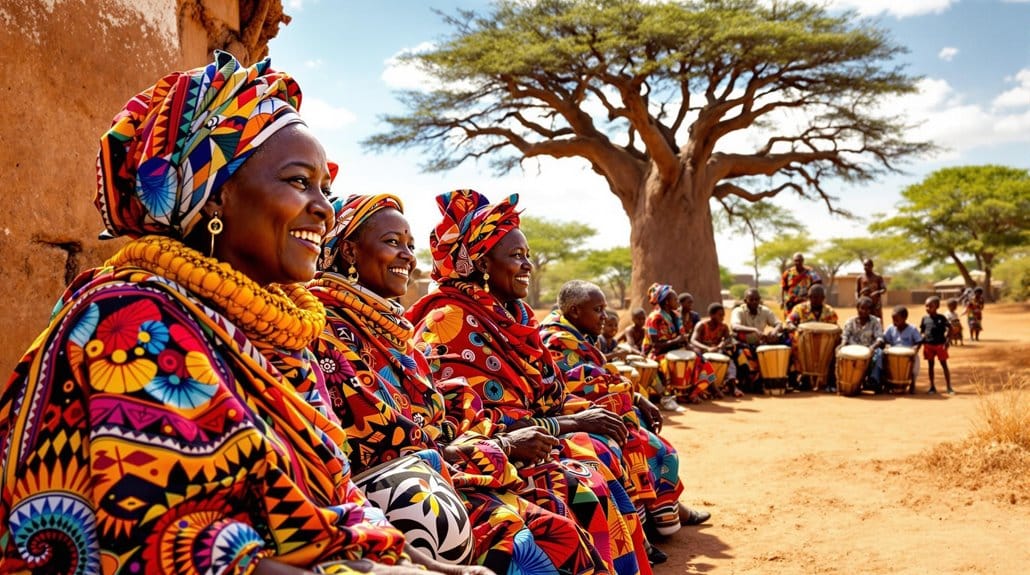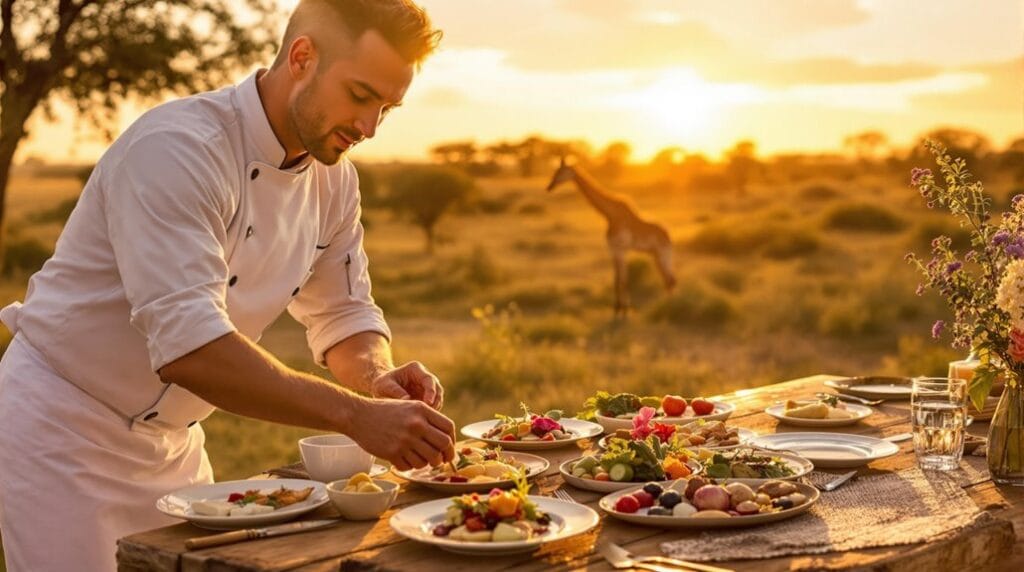When you attend a traditional African festival, the vibrant colors and rhythmic dances resonate like a heartbeat, echoing the wisdom of generations past. You can't help but notice how these practices are rooted in ancestral lineage, shaping identities and community bonds in profound ways. Each ritual serves as a bridge between the living and their ancestors, revealing layers of meaning that often go unnoticed. What you might not realize is how these ancestral connections influence modern expressions of culture, weaving a tapestry of continuity and change that's both fascinating and complex.
Key Takeaways
- Ancestral lineage serves as a foundation for identity and community cohesion, influencing cultural practices and collective memory in African societies.
- Rituals and ceremonies, such as animal sacrifices, reflect ancestral beliefs and reinforce communal bonds, ensuring continuity of traditions across generations.
- Ancestral guidance is sought through spiritual practices and communal offerings, maintaining social harmony and cultural balance in daily life.
- Historical adaptations of lineage practices show resilience in preserving cultural heritage, despite colonial disruptions and external influences.
- Contemporary expressions, including art and social media, revive and promote ancestral knowledge, fostering a sense of belonging and cultural pride.
Significance of Ancestral Lineage
Ancestral lineage holds immense significance in African cultures, deeply intertwining identity and community. When you explore the essence of your roots, you'll find that this lineage shapes who you're and how you connect with others. It's not just a matter of family trees; it's about understanding the historical context that has molded societies. For instance, the legacies of kingdoms like the Ashanti and Zulu remain powerful reminders of heritage, inspiring respect and pride.
Cultural practices such as traditional ceremonies often involve rituals that honor ancestors, acknowledging their protective roles over the living. These practices aren't merely ceremonial; they affirm your existence within a broader narrative that spans generations. Through oral traditions, knowledge about family lineage is passed down, ensuring that respect for ancestors continues to thrive.
This reverence fosters a sense of belonging, weaving spiritual balance into everyday life. In African cultures, acknowledging ancestral lineage isn't just about remembering the past; it's about embracing an identity that connects you to a community, guiding you in your journey.
Cultural Practices Rooted in Ancestry
In African cultures, cultural practices rooted in ancestry serve as vital expressions of identity and community cohesion. These traditions often manifest through traditional ceremonies where animals are slaughtered, and ancestors' names are invoked, forging a deep connection to lineage and heritage. Such rituals highlight the cultural significance of ancestor veneration, ensuring that the wisdom of the past guides the present.
Oral traditions act as vessels for passing down knowledge about family rituals, cementing cultural practices across generations. For instance, fertility festivals and spiritual interventions are heavily influenced by ancestral beliefs, showcasing how lineage shapes community celebrations. The legacy of ancestors resonates in contemporary African music and art, where themes of ancestry explore cultural identity and continuity.
Here's a brief overview of how these practices manifest:
| Practice Type | Description | Cultural Significance |
|---|---|---|
| Traditional Ceremonies | Rituals involving animal sacrifice and invocation of ancestors | Maintain harmony and seek guidance |
| Oral Traditions | Passing down family rituals and histories | Preserve cultural identity |
| Fertility Festivals | Celebrations influenced by ancestral beliefs | Strengthen community bonds |
| Contemporary Arts | Music and art exploring ancestral themes | Reinforce cultural continuity |
These practices bind communities, nurturing a sense of belonging and identity.
Ancestral Influence on Community Identity
When you consider the role of ancestors in African cultures, you see how they shape community identity through rituals and ceremonies that reinforce shared values.
These traditions not only invoke the wisdom of those who came before but also help preserve collective memory, ensuring that the spirit of the community endures.
As you explore this connection, it becomes clear that honoring ancestors fosters a sense of belonging and unity among members, anchoring them to their cultural heritage.
Role of Ancestors
Ancestors serve as a significant link between the past and present in African cultures, shaping community identity through their enduring influence. Their veneration fosters a deep sense of belonging, connecting you to a lineage that transcends generations. By honoring your ancestors, you maintain spiritual balance and cultural continuity, ensuring that their wisdom informs your daily life.
| Aspect of Ancestral Influence | Description |
|---|---|
| Guiding Spirits | Ancestors act as protectors and guides, offering wisdom and support. |
| Community Cohesion | Shared reverence for ancestors strengthens social bonds and unity. |
| Knowledge Transmission | Oral traditions preserve ancestral stories, ensuring cultural practices endure. |
| Resilience and Identity | The legacy of ancestors instills pride, helping communities navigate challenges. |
In embracing these cultural practices, you contribute to a collective identity that honors your heritage. The strength derived from your ancestors not only shapes personal values but also fortifies the community against adversity. Ultimately, understanding and respecting the role of ancestors provides you with a rooted sense of identity, empowering you to carry forward their legacy with pride.
Rituals and Ceremonies
Rituals and ceremonies serve as essential expressions of the connection between ancestral reverence and community identity in many African cultures. These practices often include the slaughtering of animals and invoking the names of ancestors, highlighting the profound respect communities hold for their ancestral lineage. By participating in these rituals, you not only honor your forebears but also reinforce the bonds that tie you to your community.
Oral traditions play an important role in passing down knowledge about these ceremonies, ensuring that every member remains intimately connected to their heritage. For instance, fertility festivals serve as a vibrant reminder of the community's desire for balance and harmony, showcasing how spiritual interventions can influence daily life.
Through these rituals, cultural continuity is maintained, weaving the past into the present. You'll find that respecting ancestors during these ceremonies isn't just a duty; it's a way to affirm your place within the community.
This shared participation deepens your sense of belonging, creating a collective identity that echoes through generations. In this way, rituals and ceremonies become significant threads in the rich tapestry of community identity, intertwining the living with the spirits of those who came before.
Collective Memory Preservation
Collective memory serves as the lifeblood of community identity in many African cultures, intertwining the past with the present through shared experiences and narratives. This preservation of collective memory isn't just about recalling events; it's about embodying the essence of your cultural heritage.
You'll find that ancestral influence permeates every aspect of life, shaping how communities celebrate their histories and traditions.
Here are some key aspects of collective memory preservation:
- Oral Traditions: Knowledge about ancestry is passed down through storytelling, ensuring continuity across generations.
- Traditional Ceremonies: Events like fertility festivals invoke ancestors' names, reinforcing their enduring presence.
- Art and Music: Modern expressions celebrate lineage and heritage, instilling pride within communities.
- Spiritual Practices: Acknowledgment of ancestral spirits maintains social harmony and cultural balance.
- Cultural Significance: Kingdoms like the Ashanti and Zulu highlight the historical importance of ancestors in shaping identities.
As you engage with these traditions of Africa, you'll discover that collective memory not only reflects who you're but also strengthens your connection to others, fostering a profound sense of belonging.
Spiritual Connections to Ancestors
In African spirituality, your connection to ancestors forms a crucial part of your identity, offering both guidance and protection.
Rituals of veneration, such as communal ceremonies and offerings, serve to honor these spirits and reinforce their influence in your life.
Ancestral Guidance and Protection
How do you connect with the wisdom of your ancestors? Embracing ancestral guidance is crucial in African spirituality, where these spirits are seen as essential protectors and sources of wisdom.
By honoring your lineage, you cultivate a deeper sense of belonging and strengthen your cultural heritage. Here are some ways to foster that connection:
- Engage in Rituals: Participate in practices that honor your ancestors, like offerings and ceremonies.
- Seek Guidance: Reflect on your life choices and ask for insight from your ancestral spirits.
- Share Stories: Talk about your family's history, allowing their experiences to shape your identity.
- Create a Sacred Space: Designate an area in your home for ancestral veneration, filled with meaningful items.
- Cultivate Community: Connect with others who share your heritage, fostering a collective understanding of your cultural roots.
Rituals of Veneration Practices
Honoring your ancestors through rituals of veneration deepens your spiritual connection and reinforces the cultural values that shape your identity.
These rituals are more than mere ceremonies; they embody respect for your ancestral lineage, reflecting a profound acknowledgment of the guidance and protection your ancestors provide. During these gatherings, offerings—often including the slaughtering of animals—are made, invoking the names of your forebears to maintain spiritual balance and seek blessings for your community.
Such practices are integral to social and religious life, ensuring the well-being of both families and the larger community. They create a space where ancestral spirits are called upon for support and wisdom, fostering a sense of unity and purpose.
The importance of oral traditions can't be understated, as they serve as the vessels through which knowledge about these rituals is passed down, preserving cultural heritage and reinforcing community ties.
Historical Context of Lineage Practices
Understanding the historical context of lineage practices in Africa reveals a complex tapestry of cultural beliefs and social structures that have evolved over centuries. The historical significance of ancestral lineage can be seen in the way it shapes leadership roles and societal responsibilities in various kingdoms, such as the Ashanti and Zulu. These practices illustrate how deeply rooted the connection to ancestors is within communities.
Key aspects of this context include:
- Ancestral lineage influencing daily life and governance.
- Oral traditions preserving knowledge and practices across generations.
- Rituals and ceremonies honoring ancestors, reinforcing cultural identity.
- Adaptations in lineage practices due to colonial disruptions.
- Continuous commitment to cultural continuity despite external influences.
These elements highlight how lineage isn't just a matter of heritage; it embodies a sense of belonging and identity.
As you explore these practices, you'll find that they serve as a bridge linking past and present, ensuring that the wisdom of ancestors continues to guide the living.
Embracing this historical context enriches your understanding of the cultural fabric that defines many African communities today.
Contemporary Expressions of Ancestry
Celebrating ancestral heritage in contemporary Africa manifests through various vibrant expressions that connect the past with the present. You'll find that contemporary African music often weaves in ancestral themes, drawing inspiration from traditional rhythms and narratives that celebrate lineage and rich cultural heritage. This musical fusion not only entertains but also serves as a reminder of the deep roots that bind communities together.
Reviving traditional ceremonies like fertility festivals reflects a profound respect for ancestral practices. These rituals honor ancestors while seeking their blessings, reinforcing the connection you feel with those who came before you.
Modern African art, too, showcases ancestral stories and symbols, utilizing mediums such as sculpture and textile art to convey identity and continuity.
In urban settings, community gatherings and storytelling events breathe life into oral traditions, fostering a collective memory that honors ancestors and their contributions.
Additionally, social media platforms have become essential venues for sharing and promoting ancestral heritage, allowing younger generations to engage with their roots in innovative ways.
These contemporary expressions of ancestry remind you that the past isn't just history; it's a living part of your cultural identity.
Celebrating Heritage Through Cultural Travel
How can a journey through ancestral landscapes deepen your connection to heritage? Traveling to countries like Ghana and Benin offers you a unique chance to reconnect with your roots, enriching your understanding of your ancestral lineage.
By visiting historical sites such as Elmina Castle, you'll gain firsthand insights into the resilience and struggles of your ancestors, weaving their stories into your own narrative.
Heritage trips not only celebrate African cultural practices but also foster a sense of belonging. Engaging with local communities allows for meaningful cultural exchange, where you can immerse yourself in traditional art, music, and cuisine.
Here are some key aspects to contemplate:
- Explore historical landmarks that reveal the past.
- Participate in local festivals to experience vibrant customs.
- Taste traditional dishes that reflect your heritage.
- Support local artisans to preserve cultural crafts.
- Share stories with community members, building connections.
Embracing cultural tourism strengthens your ties to your heritage, elevating the importance of preserving African cultural identity while supporting local economies.
As interest in heritage trips grows, your journey becomes a tribute to the ancestors who shaped your identity.
Preserving Ancestral Knowledge and Traditions
While many cultures grapple with the loss of traditions in a rapidly changing world, African communities remain steadfast in preserving ancestral knowledge and practices. You'll find that this commitment serves as a foundation for cultural identity, where oral traditions play a crucial role in passing down family rituals and histories.
These narratives not only bind generations together but also reinforce a sense of belonging. Traditional ceremonies often invoke ancestors' names, showcasing the profound significance of ancestral reverence in daily life. By participating in these rituals, you connect with a lineage that transcends time, emphasizing the continuity of cultural practices.
The legacy of kingdoms like the Ashanti and Zulu illustrates how ancestral history shapes societal structures today, reminding us of our roots. Moreover, ancestral knowledge enriches agricultural practices, spiritual interventions, and community gatherings, ensuring that customs remain relevant.
As communities increasingly reclaim and revitalize traditional religions, they recognize that honoring ancestral veneration fosters unity and resilience against the impacts of colonialism. In this way, you not only preserve the past but also empower your community to thrive in the present and future, weaving together the threads of cultural identity.
Frequently Asked Questions
What Is the Importance of Ancestors in African Cultures?
Ancestors hold immense importance in African cultures, as their veneration provides spiritual guidance and reinforces cultural identity. Through ritual practices, you connect with lineage, fostering belonging and continuity, enriching your life with deep-rooted traditions.
What Place Did Ancestors Hold in African Beliefs?
You might think ancestors are just past figures, but in African beliefs, they're revered for their spiritual guidance, embodying ancestral reverence. They strengthen lineage connections, shaping cultural identity and fostering a profound sense of belonging.
In What Ways Did the Traditional Africans Maintain Their Relationship With the Ancestors?
You engage in ancestor worship through spiritual rituals and communal gatherings, where you honor your lineage. Oral traditions pass down wisdom, creating bonds that keep ancestral spirits alive, guiding your community and enriching your cultural identity.
How Has African Culture Influenced African American Culture?
African culture's vibrant music traditions and soulful storytelling techniques contrast beautifully with culinary influences and spiritual practices in African American life. You'll find these elements weaving together, creating a rich tapestry of shared heritage and belonging.
Conclusion
In today's fast-paced world, the threads of ancestral lineage weave a rich tapestry that binds communities together. By honoring traditions, you not only celebrate your heritage but also foster a deeper connection with your roots. Just like the ancient storytellers who passed down wisdom around a fire, you carry the torch of your lineage, ensuring that the essence of your culture thrives amidst modern influences. Embracing this legacy empowers you to navigate the complexities of contemporary life with a profound sense of belonging.









